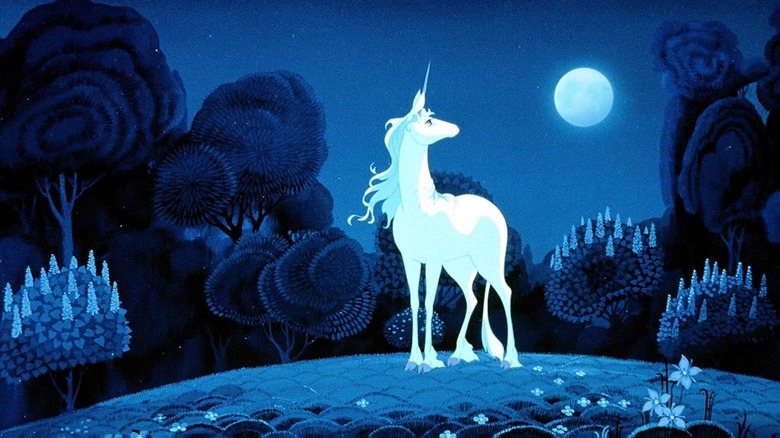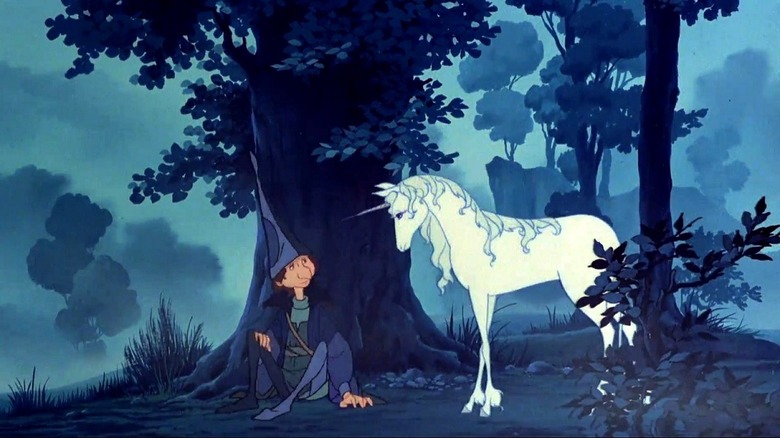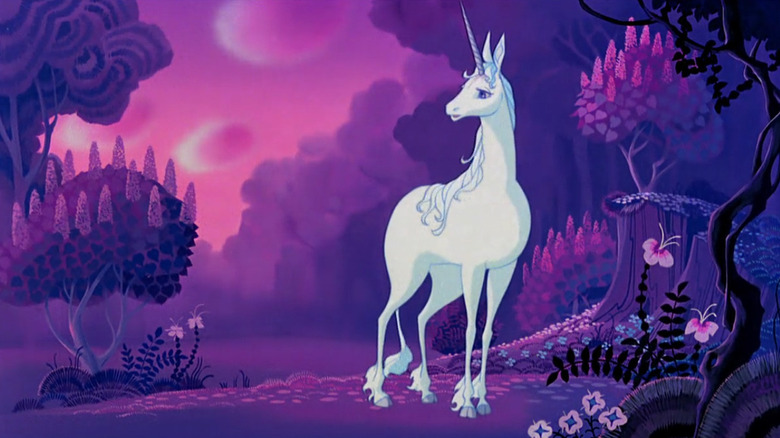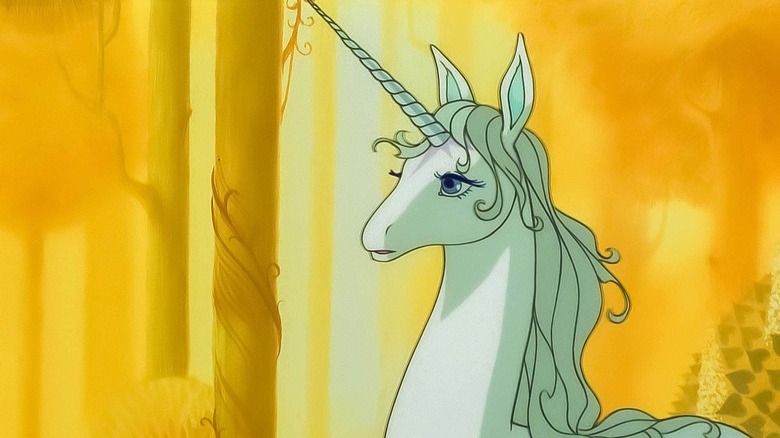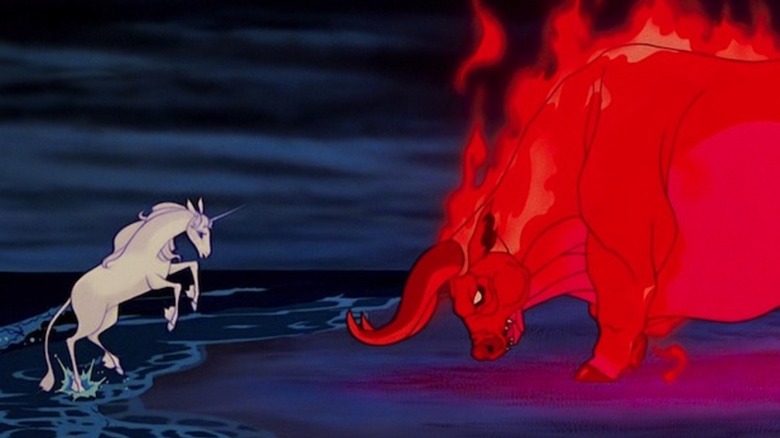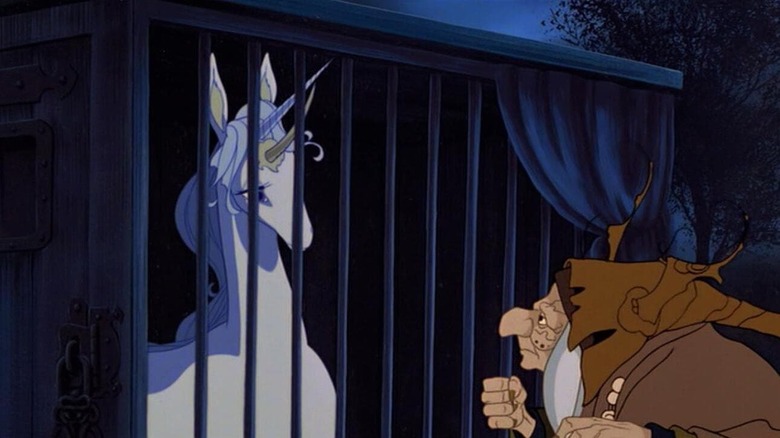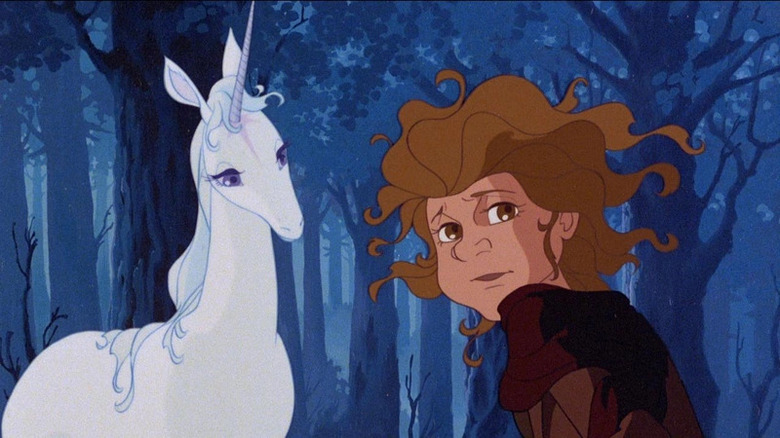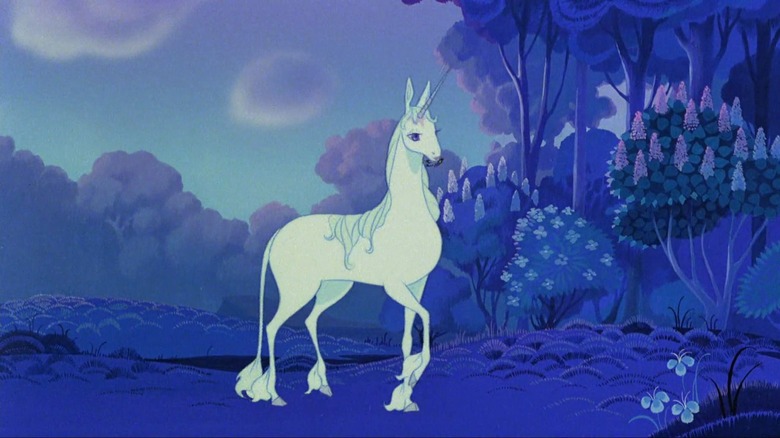Why The Last Unicorn Is A Forgotten Animated Classic
"The Last Unicorn" was my favorite movie as a kid. I watched it over and over, never tiring of that gorgeous animation, the America soundtrack, or the strange sense of sadness I couldn't seem to shake after the credits rolled. It was weird, wonderful, and unlike anything else I had ever seen. How often I watch it may have diminished over time, but I never actually stopped. In fact, I'd say I put it on at least once every couple of years. The movie turns 40 this month and honestly, it still holds up.
Based on Peter S. Beagle's novel of the same name — he also wrote the screenplay — "The Last Unicorn" tells the story of the titular creature, who goes off in search of what happened to the rest of her kind. Along the way, she encounters friends, foes, and everything in between (I'm looking at you, butterfly).
When people talk about movie masterpieces, "The Last Unicorn" doesn't often come up, but in honor of the film's 40th anniversary, let's talk about exactly why it deserves to dominate that conversation. If you haven't seen the film, please watch it before reading, because 40-year-old spoilers lie ahead!
This film has a stacked cast
Interestingly, "The Last Unicorn" was originally intended for adults, and was cast accordingly. Mia Farrow stars as the titular unicorn and voices her with the perfect mixture of grace and dignity. She truly sounds like a mythical creature. The unicorn winds up with two companions on her journey: the somewhat inept magician Schmendrick — which is Yiddish for fool — and Molly Grue, a cook who belonged to a band of outlaws before joining them. Alan Arkin plays the wannabe wizard (and third-rate pickpocket), a man who didn't realize how much he was searching for purpose until the unicorn gave him one. Tammy Grimes portrays the fiercely loyal Molly, and her performance during Molly's initial meeting with the unicorn never fails to move me. Then there's Angela Lansbury as Mommy Fortuna, the witch who captures the unicorn early on in her quest. Her highly characterized voice is complete perfection in this role.
That's not all though! King Haggard is performed by none other than Christopher Lee, who loved the role so much he even voiced the German dub! His son Prince Lir is brought to life by Jeff Bridges. At the time a lesser-known actor, Bridges practically begged to be a part of the film. He wasn't the only one. René Auberjonois, who steals his scene as the Skull, was such a huge fan of the book that he was intent on being a part of the film. Seriously, every one of these actors is in top form here.
The animation is absolutely gorgeous
One of the most memorable aspects of "The Last Unicorn" is its striking animation. The movie was made by Rankin/Bass Animated Entertainment. You've probably seen their 1964 stop-motion TV special, "Rudolph the Red-Nosed Reindeer." However, the studio also made another one of my childhood favorites, the animated version of "The Hobbit," which released in 1977. Rankin/Bass is responsible for the 1980 "The Return of the King" adaptation as well, though they didn't hold the rights for the rest of Tolkien's series.
What you may not know is that "The Last Unicorn" is actually something of a secret Studio Ghibli film. Rankin/Bass outsourced the animation to Topcraft in Japan, which dissolved in 1985 before reforming as Studio Ghibli. The film's animation is absolutely stunning. From the credits mirroring the famed "Unicorn Tapestries" to the waves of unicorns emerging from the sea at the Red Bull's defeat, the film is utterly captivating. Some of that can be chalked up to stellar vocal performances, but much of what still moves me about this film is how lush the visuals are.
The animation brings every aspect of the novel to life so vividly. Many elements of Beagle's book seem impossible to capture, but somehow, the team at Topcraft managed it. Even the unicorn herself looks exactly as the author described her.
"The unicorn lived in a lilac wood, and she lived all alone. She was very old, though she did not know it, and she was no longer the careless color of sea foam but rather the color of snow falling on a moonlit night. But her eyes were still clear and unwearied, and she still moved like a shadow on the sea."
That soundtrack is in my heart for life
Another clue that this film was not intended for children was the decision to get a staple of '70s radio, America, to play its tunes. The songs and fantastic score were composed by prolific songwriter Jimmy Webb and played by the London Symphony Orchestra, though several of the tracks were performed by America. I'm well aware that my soft spot for the band's catalog can be traced right back to watching "The Last Unicorn" obsessively as a child, but I still maintain that "Sister Golden Hair" rules! Plus, you've also got "Lonely People," Ventura Highway," and of course, "Horse with No Name," but I digress.
There are also two songs sung by characters in the film. While Jeff Bridges' vocals were kept in, Mia Farrow's were actually replaced with studio singer Katie Irving for the duet between Prince Lir and Lady Amalthea, "That's All I've Got to Say." It's a lovely song that still gets me every time. I am even listening to the soundtrack as I write this. Farrow's voice can be heard singing "Now That I'm a Woman" in the film, though it was dubbed with Irving's voice for the soundtrack, which has only been officially released in Germany. Yes, that does mean I tracked down the CD, which is titled "Das Letzte Einhorn." The title track actually charted in Germany after the film's release. America even took to playing it live.
The story is timeless
Listen, I could talk about the best quotes from this movie all day, because there are many. Naturally, much of the dialogue comes straight from Beagle's book, as he also penned the screenplay. His words are, well, enchanting doesn't even begin to cover it. There are so many lines from this film that have stuck with me, but the story itself is timeless: a magical quest that ends less in a "happily ever after" and more in a "there are no happy endings because nothing ends."
One central idea of the film is the difference between loneliness and being alone. The unicorn spent an untold amount of time in her forest, content being the only one of her kind there. However, knowing she might be the last remaining unicorn in the world prompts her to risk everything to discover what happened to her brethren. What could be more lonely than knowing you are the only one of your kind?
The unicorn's desperate search for others leads to her being transformed into the woman who would come to be known as the Lady Amalthea partway through the film. An oblivious Schmendrick (magic, do as you will!) succeeds in saving her from the villainous Red Bull, but the cost to her is catastrophic. The magician struggles to comprehend what Molly immediately understands: the unicorn will lose herself in this form. She very nearly does and remains forever altered as a result. There are several aspects of this film that could be described as frightening, but the scariest thing might just be the depth of human emotion.
Complicated villains
The unicorn meets several villainous characters on her journey, and none of them are typical fairy tale Big Bads. A major theme of the film is disillusionment, and one of the saddest things about the world the unicorn inhabits is that most people see her as nothing more than a white horse. Magic has disappeared so completely that when she is captured by Mommy Fortuna, the witch puts a fake horn on her, assuming people won't believe she's a true unicorn. Mommy Fortuna has a circus made up of her illusions, with the unicorn and the harpy Celaeno being the only two truly magical creatures she has captured. The woman knows that harpy will be the death of her, but she's accepted it and basically welcomes it in one of the movie's most chilling moments.
King Haggard is a surprisingly complex villain as well. Sure, he's just as monstrous as any wicked witch or bitter queen, but it's not power he seeks, at least not in any traditional sense: it's happiness. He's sought it in magicians or court jesters, and even fatherhood, but still, joy continues to elude him. It's only watching the unicorns, driven into the sea by the Red Bull, that brings him a modicum of pleasure. His kingdom has fallen into disrepair and he appears to have no subjects to speak of, caring only about gathering the world's unicorns. Even the Red Bull, a terrifying creature surrounded by flame who serves only to drive the unicorns for Haggard, is trapped as well, seemingly only emerging from his passageway to find them.
Ruminating on regret
When I watched the film as a kid, I knew it was sad, but I couldn't quite pin down why. It should be a happy ending. After all, the unicorn had saved the rest of her fellows and yet, the final moments of the film feel bittersweet. The Lady Amalthea had to be returned to her original form, but when the time came and her mission hung in the balance ... she wanted to remain human and be with Prince Lir. Even as a child, I remember feeling torn. She had to rescue the other unicorns, but wasn't love supposed to conquer all? Shouldn't magic save the day, rather than further complicate things? What kind of fairy tale is this?
Of course, I didn't understand the central theme here, because what do children know of regret? If there's one thing kids can't truly grasp that adults are keenly aware of, it's that. Children haven't lived enough life to fully appreciate just how much one can screw it all up completely by accident. When I began watching the film as an adult, I noticed it struck a somewhat different chord with me. The unicorn says it explicitly: that being mortal is what caused her to understand regret. What better defines the human experience than that?
One of the most beautiful aspects of that scene is that the unicorn is still grateful for her time as a human. Despite her regrets, she wouldn't have traded her time with Lir. So much there about joy and pain, the way one can only exist because of the other. Similarly, the idea that it's death that truly gives life meaning, something an immortal being like the unicorn couldn't possibly understand before the time she spent as a human.
The Last Unicorn remains unique
I was completely enamored with unicorns as a kid, a feeling that would later evolve into a love of horses. So, I'm sure my initial interest in this movie was very much rooted in that. However, the film means even more to me now than it did then, since it hits me on a much deeper level. As a kid I desperately wanted the unicorn to free her kind and felt saddened that she had to leave Prince Lir to do it. As an adult, I can't help but ruminate on my own regrets: lost love, tremendous grief, and wasted opportunities permeate my mind as the film comes to a close. It makes me cry every time.
Isn't that what the best movies do? They force us to confront the feelings we fear most, our own Red Bull, if you will. However, at the same time, few movie moments make my heart soar like seeing those unicorns cresting the waves as they escape from the sea. It's the way the film makes us hold these conflicting emotions that causes the ending to land so beautifully. "The Last Unicorn" has been largely forgotten, which is upsetting because it's a masterpiece. Even after all these years, the film remains unique. There truly is nothing else quite like it.
